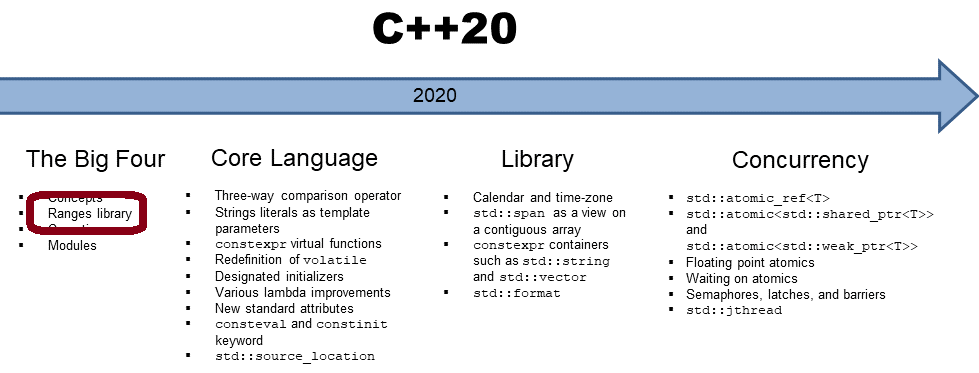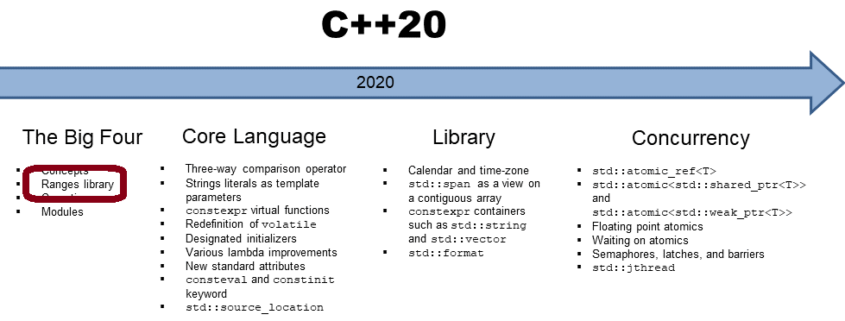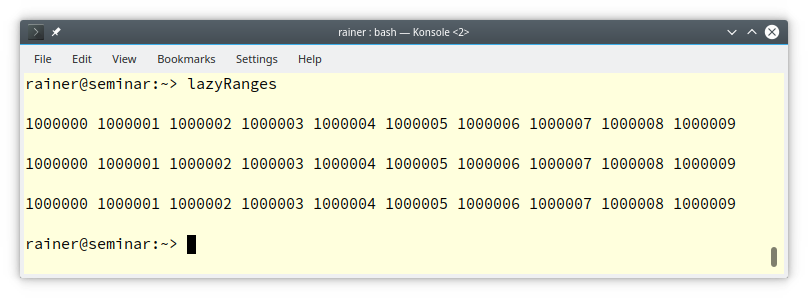The Ranges Library in C++20: More Details
Working with the Standard Template Library (STL) is much more comfortable and powerful thanks to the ranges library. The algorithms of the ranges library are lazy, can work directly on the container, and can quickly be composed. But there is more to it:

Before I dive deep into the ranges library in C++20, I want to recap in a few sentences the three main features of the ranges: The algorithms of the ranges can directly operate on the container, evaluate their arguments lazily, and can be composed.
Direct on the Container
The classical algorithms of the Standard Template Library (STL) are sometimes a little inconvenient. They need a beginning and an end iterator. This is often more than you want to write.
// sortClassical.cpp #include <algorithm> #include <iostream> #include <vector> int main() { std::vector<int> myVec{-3, 5, 0, 7, -4}; std::sort(myVec.begin(), myVec.end()); // (1) for (auto v: myVec) std::cout << v << " "; // -4, -3, 0, 5, 7 }
std::sort (line 1) could be executed on the entire container? Thanks to the ranges library, this is possible in C++20.// sortRanges.cpp #include <algorithm> #include <iostream> #include <vector> int main() { std::vector<int> myVec{-3, 5, 0, 7, -4}; std::ranges::sort(myVec); // (1) for (auto v: myVec) std::cout << v << " "; // -4, -3, 0, 5, 7 }
std::ranges::sort (line 1) operates directly on the container.
Lazy Evaluation
std::views::iota is a range factory for creating a sequence of elements by successively incrementing an initial value. This sequence can be finite or infinite. The elements of the range factory are only created when needed.// lazyRanges.cpp #include <iostream> #include <ranges> int main() { std::cout << "\n"; for (int i: std::views::iota(1'000'000, 1'000'010)) { // (1) std::cout << i << " "; } std::cout << "\n\n"; for (int i: std::views::iota(1'000'000) // (2) | std::views::take(10)) { std::cout << i << " "; } std::cout << "\n\n"; for (int i: std::views::iota(1'000'000) // (3) | std::views::take_while([](auto i) { return i < 1'000'010; } )) { std::cout << i << " "; } std::cout << "\n\n"; }
The small program shows the difference between creating a finite data stream (line 1) and an infinite data stream (lines 2 and 3). When you create an infinite data stream, you need a boundary condition. Line (2) uses the view std::views::take(10), and line 3, the view std::views::take_while. std::views::take_while requires a predicate. This is an ideal fit for a lambda expression: [](auto i) { return i < 1'000'010; }. Since C++14, you can use single quotes as separators in integer literals: 1'000'010. All three std::views::ranges calls produce the same numbers.
I already used the pipe operator (|) in this example for function composition. Let’s go one step further.
 Modernes C++ Mentoring
Modernes C++ Mentoring
Do you want to stay informed: Subscribe.
Function Composition
The following program primesLazy.cpp creates the first ten prime numbers starting with one million.
// primesLazy.cpp #include <iostream> #include <ranges> bool isPrime(int i) { for (int j=2; j*j <= i; ++j){ if (i % j == 0) return false; } return true; } int main() { std::cout << '\n'; auto odd = [](int i){ return i % 2 == 1; }; for (int i: std::views::iota(1'000'000) | std::views::filter(odd) | std::views::filter(isPrime) | std::views::take(10)) { std::cout << i << " "; } std::cout << '\n'; }
std::views::iota(1'000'000)) and apply two filters. Each filter needs a predicate. The first filter lets the odd element pass (std::views::filter(odd)), and the second filter lets the prime numbers pass (std::views::filter(isPrime)). To end the infinite data stream, I stop after ten numbers (std::views::take(10)). Finally, here are the first ten prime numbers starting with one million.
You may ask: Who starts the processing of this data pipeline? Now, it goes from right to left. The data sink (std::views::take(10)) want to have the next value and ask its predecessor. This request goes on until the range-based for-loop as the data source can produce one number.
This was my short recap. When you want to read more about the ranges library, read my previous posts:
- The Ranges Library
- Functional Pattern with the Ranges Library
- Pythonic with the Ranges Library
- Pythons range Function, the Second
- Pythons map Function
Now, it’s time to write about something new.
std Algorithms versus std::ranges Algorithms
The algorithms of the algorithm library and the memory libray have ranges pendants. They start with the namespace std::ranges. The numeric library does not have a ranges pendant. Now, you may have the question: Should I use the classical std or new std::ranges algorithm?
std::sort and the new std::ranges::sort. First, here are the various overloads of std::sort and std::ranges::sort.template< class RandomIt > constexpr void sort( RandomIt first, RandomIt last ); template< class ExecutionPolicy, class RandomIt > void sort( ExecutionPolicy&& policy, RandomIt first, RandomIt last ); template< class RandomIt, class Compare > constexpr void sort( RandomIt first, RandomIt last, Compare comp ); template< class ExecutionPolicy, class RandomIt, class Compare > void sort( ExecutionPolicy&& policy, RandomIt first, RandomIt last, Compare comp );
std::sort has four overloads in C++20. Let’s see what I can deduce from the names of the function declarations. All four overloads take a range given by a begin and end iterator. The iterators must be random access iterators. The first and third overloads are declared as constexpr and can run at compile time. The second and fourth overload require an execution policy. The execution policy lets you specify if the program should run sequentially, parallel, or vectorized.Compare has to be a binary predicate. A binary predicate is a callable that takes two arguments and returns something convertible to a bool.std::sort do not stand for concepts but only for documentation purposes. In std::ranges::sort the names are concepts.template <std::random_access_iterator I, std::sentinel_for<I> S, class Comp = ranges::less, class Proj = std::identity> requires std::sortable<I, Comp, Proj> constexpr I sort(I first, S last, Comp comp = {}, Proj proj = {}); template <ranges::random_access_range R, class Comp = ranges::less, class Proj = std::identity> requires std::sortable<ranges::iterator_t<R>, Comp, Proj> constexpr ranges::borrowed_iterator_t<R> sort(R&& r, Comp comp = {}, Proj proj = {});
Thanks a lot to my Patreon Supporters: Matt Braun, Roman Postanciuc, Tobias Zindl, G Prvulovic, Reinhold Dröge, Abernitzke, Frank Grimm, Sakib, Broeserl, António Pina, Sergey Agafyin, Андрей Бурмистров, Jake, GS, Lawton Shoemake, Jozo Leko, John Breland, Venkat Nandam, Jose Francisco, Douglas Tinkham, Kuchlong Kuchlong, Robert Blanch, Truels Wissneth, Mario Luoni, Friedrich Huber, lennonli, Pramod Tikare Muralidhara, Peter Ware, Daniel Hufschläger, Alessandro Pezzato, Bob Perry, Satish Vangipuram, Andi Ireland, Richard Ohnemus, Michael Dunsky, Leo Goodstadt, John Wiederhirn, Yacob Cohen-Arazi, Florian Tischler, Robin Furness, Michael Young, Holger Detering, Bernd Mühlhaus, Stephen Kelley, Kyle Dean, Tusar Palauri, Juan Dent, George Liao, Daniel Ceperley, Jon T Hess, Stephen Totten, Wolfgang Fütterer, Matthias Grün, Ben Atakora, Ann Shatoff, Rob North, Bhavith C Achar, Marco Parri Empoli, Philipp Lenk, Charles-Jianye Chen, Keith Jeffery, Matt Godbolt, Honey Sukesan, bruce_lee_wayne, Silviu Ardelean, schnapper79, Seeker, and Sundareswaran Senthilvel.
Thanks, in particular, to Jon Hess, Lakshman, Christian Wittenhorst, Sherhy Pyton, Dendi Suhubdy, Sudhakar Belagurusamy, Richard Sargeant, Rusty Fleming, John Nebel, Mipko, Alicja Kaminska, Slavko Radman, and David Poole.
| My special thanks to Embarcadero |  |
| My special thanks to PVS-Studio |  |
| My special thanks to Tipi.build |  |
| My special thanks to Take Up Code |  |
| My special thanks to SHAVEDYAKS |  |
Modernes C++ GmbH
Modernes C++ Mentoring (English)
Rainer Grimm
Yalovastraße 20
72108 Rottenburg
Mail: schulung@ModernesCpp.de
Mentoring: www.ModernesCpp.org








Leave a Reply
Want to join the discussion?Feel free to contribute!